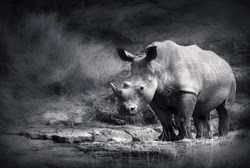
Top stories






More news


Marketing & Media
Ads are coming to AI. Does that really have to be such a bad thing?














In order to address this problem, government and various other role-players have initiated various interventions to address the surge in rhino poaching. The workshop comes as the number of rhino poached for their horn, since January 2013, increased to 919.
So far this year, 560 rhino have been poached in the Kruger National Park, while the provincial figures stand at a total of 359. In Limpopo alone, 105 rhino have been poached, 82 in North West, 79 in KwaZulu-Natal and 77 in Mpumalanga. The total number of suspected poachers arrested has increased to 316.
The meeting was opened by Water and Environmental Affairs Minister, Edna Molewa, who emphasised the need for cooperation by various stakeholders and indicated the government's plan moving forward. She reiterated that continuing to do more of the same is not working. The solution to rhino poaching is complex and needs innovative solutions.
Members of the Portfolio Committee, under the chairmanship of advocate Johnny de Lange, were briefed on all issues related to rhino conservation, management, safety and security, trends, structure, nature of black markets in wildlife products, consumer behaviour, and rhino economics. Discussions also focussed on possible solutions to destroy or at least seriously debilitate the existence of a lucrative, rapidly growing, underground black market illegally trading in rhino horn.
Some of the proposed solutions included:
De Lange emphasised that the committee expects that all interventions should be based on and support protection, conservation and sustainable use, which are the cornerstones of the environmental rights afforded to the people of South Africa in the Bill of Rights of the Constitution. The principle of sustainable use as an integral part of conservation is not only enshrined in the Constitution and the country's environmental legislation.
It was emphasised that all parties present shared a common concern and interest, and that more similar engagements need to be held as the government prepares to table its proposal regarding the trade in rhino horn to CITES COP17 in 2016.